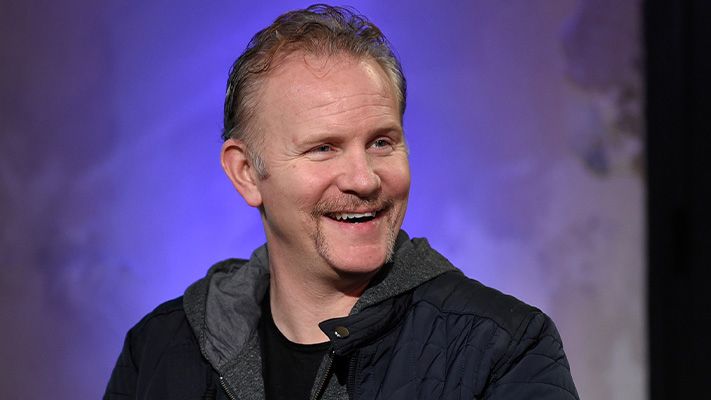
“Somebody find me a carrot stick.” So said millions of moviegoers upon exiting screenings of Super Size Me, documentarian Morgan Spurlock’s gonzo 2004 sensation. Spurlock’s film, based on a stomach-churning conceit, tested the limits of the director’s physical, psychological, and (not least) spiritual courage. For 30 days, with cameras capturing every greasy belch and sigh, the filmmaker consumed nothing but McDonald’s. If the iconic movie poster of the 1970s was Roger Kastel’s terrifying work for Jaws, the aughts equivalent may well have been Spurlock staring fearfully at passersby, his open mouth stuffed with fries.
Born in West Virginia in 1970, Spurlock studied film at New York University before signing on as a production assistant to Luc Besson’s Leon (1994). From there followed modest television success at the helm of the self-created (and later MTV-produced) reality series I Bet You Will. Spurlock’s role on that program was to offer contestants sums of money in exchange for debasing behavior. In an episode that foreshadowed his interest in culinary adventurism, the young host forced one woman to eat her own hair clippings.

Spurlock’s breakthrough idea came in 2002, during a period of nationally covered litigation against the hamburger giant. Teenagers Jazlyn Bradley and Ashley Pelman had sued McDonald’s for “damages related to their obesity,” as the New York Times tersely put it, and the moment seemed right for an anti-fast-food exposé. Spurlock, with his knack for self-promotion and food-related daring, raised $65,000, wrote a rudimentary script, and started filming. Rule one: Every purchased item had to be consumed in its entirety. Rule two: If asked by an employee to “supersize” his meal, Spurlock had to answer in the affirmative.
The movie that resulted from this stunt grossed a startling $22 million and was nominated for an Academy Award for best documentary feature. Yet its cultural impact was arguably more impressive. Shuffling sluggishly from theaters, having just watched a man attempt Big Mac-abetted suicide, moviegoers entertained as rarely before conversations about fast food and public health. Six weeks after the film’s release, McDonald’s did away with its supersized portions altogether. Even New York City’s controversial “Big Gulp” ban (2012) seemed reasonably connectable to Spurlock’s documentary. Super Size Me had been a signpost on the Left’s road from Clinton-era libertinism to nannying. Having problematized our hamburgers, liberals took the logical next step and seized our sodas.
This “progressive” squeamishness was alive and well when, four years after his debut movie, Spurlock released Where in the World Is Osama Bin Laden?, a comically bad “manhunt” picture featuring, among other gags, interviews with random men on Middle Eastern streets. Unable to admit that they would just as soon abandon the hunt for the terrorist, leftist critics seized instead on the film’s spuriousness and juvenility, writing, for example, that the production was “insulting to all the real reporters who’ve died in the field looking for hard information” (Chicago Reader). Overnight, a beloved artist had become a figure of fun if not an outright pariah. Making matters worse was the fact that Spurlock’s time abroad had coincided with his wife’s pregnancy. “As if this project couldn’t wait for after his child’s birth,” a representative commentator complained.
Other documentaries followed Spurlock’s sophomore effort, among them The Greatest Movie Ever Sold (2011) and Mansome (2012), examinations of product placement and male grooming, respectively. None captured the magic of his first film. Yet even Super Size Me, a once-unassailable work of cultural protest, eventually gathered detractors. Hadn’t the filmmaker’s alcoholism, acknowledged in 2017 and indulged during his McDonald’s binge, contributed to his poor health? If so, wasn’t the movie’s depiction of fast-food-engendered bloatedness, liver damage, and depression distinctly dishonest?
CLICK HERE TO READ MORE FROM THE WASHINGTON EXAMINER
For all intents and purposes, Spurlock’s career ended 6 1/2 years ago upon the documentarian’s release of a self-incriminating “Me Too” mea culpa. Outlining a series of PG-13 offenses and misunderstandings, Spurlock sacrificed himself to the very idols that his most famous film had helped raise. Dead at 53 of complications from cancer, he is survived by three ex-wives, two sons, two brothers, and his parents.
An originator and victim of the Left’s new asceticism, Spurlock should be remembered as a man of unusual appetites. Some of them were unhealthy indeed.
Graham Hillard is the editor at the James G. Martin Center for Academic Renewal and a Washington Examiner magazine contributing writer.






